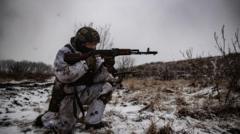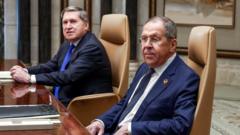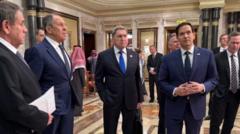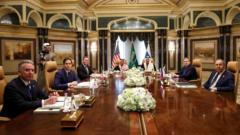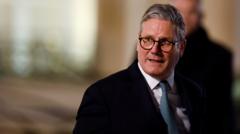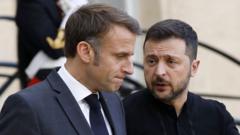In a speech at the Munich Security Conference, Vice President JD Vance criticized European nations for failing to uphold democratic values rather than addressing the urgent issue of Ukraine's tumultuous situation and U.S. relations with Russia, showcasing a growing divide in international perspectives on democratic integrity and military response.
Vance Critiques European Democracy Amid Tensions Over Ukraine

Vance Critiques European Democracy Amid Tensions Over Ukraine
U.S. Vice President JD Vance's remarks at the Munich Security Conference left attendees yearning for clarity on the government's stance regarding Ukraine, while he focused on Europe's internal democratic challenges.
Vice President JD Vance addressed European leaders at the Munich Security Conference, expressing concerns over what he deemed a retreat from democratic values within Europe. His critique came at a time when many in Europe are apprehensive about U.S. President Trump's engagements with Russia regarding the ongoing war in Ukraine. Notably, Vance refrained from discussing Ukraine, despite the continent's anxieties about Trump's recent overtures to Moscow, which have raised fears about potential territorial concessions for peace.
In his speech, Vance pointed to internal threats as Europe's greatest security dilemma, highlighting issues such as censorship and restrictions against anti-immigration parties. He cited the suppression of free speech, accusing European governments of stifling opposing viewpoints and thus abandoning fundamental democratic tenets. Vance’s comments seemed to resonate especially within the context of the Alternative for Germany (AfD) party, which other German factions have marginalized due to its extremist elements.
Vance's comments were met with immediate rebuke from German leaders, who emphasized the historical implications of allowing such parties to gain political footing, drawing a direct line to the nation's past with Nazism. German officials contended that the presence of the AfD in government would not only threaten democracy but also compromise the very values that separate the United States and Europe from authoritarian regimes.
Despite addressing serious democratic concerns, attendees left with questions about U.S. strategy, especially in relation to the urgent situation in Ukraine, where renewed hostilities and hazardous incidents, such as a recent explosion at the Chernobyl nuclear site allegedly caused by a Russian drone, continue to intensify scrutiny and calls for decisive action. Vance's prior meetings with European leaders had hinted at a complex trans-Atlantic relationship, now strained by uncertainty regarding Trump's foreign policy direction.
Alongside these tensions, U.S. Defense Secretary Pete Hegseth indicated the possibility of deploying U.S. troops as leverage against Russia, stirring further confusion amidst a rapidly shifting policy landscape. The implications of U.S. support under the Trump administration have left European allies grappling with how to advance their military preparedness and response strategies, awaiting a clearer American policy articulated through Vance's remarks.
In summary, while Vance's address underpinned critical analysis of European democratic practices, it conspicuously sidestepped the pressing issues regarding the war in Ukraine, leaving allies questioning America's commitment to their defense and the broader implications of potential peace concessions.


